A little belated, but I finally finished editing and published a special issue on “Queer Analog Game Studies” for Analog Game Studies (Volume XII, Number II). It is one of the first big undertakings I’ve made since becoming Editor-in-Chief. I also wrote an introductory essay entitled “Be Queer, Do Games: An Introduction to Queer Analog Game Studies,” which begins:
Games are opportunities. Games are diversions. Games are responsibilities. Analog games, in particular, have offered designers, players, and critics an embodied medium to imagine, render, and transform “social realities into playable form.”1 However, it is this flexibility and manipulability that also allows for problematic biases, gatekeeping, toxic fandoms, and exclusionary practices particularly versus already marginalized people and communities. In the face of these issues, Black, brown, queer, and non-stereotypical gamers and developers have created ways to speak up, call in, and take for themselves the pleasure and politics of play. For instance, actor, writer, and dungeon master phenom Aabria Iyengar told PBS News in 2023, “Growing up and acculturated as ‘other’ on several axes of identity, my brain automatically defaults to that…Even though it is uncomfortable to be othered constantly, it is what I know and it feels right…it feels like a fun opportunity to play in ‘What if being markedly different came with fun benefits?’”2
For many “marked” players, games are a chance to express themselves, to engage other people, places, and histories, to find family and community, to escape, to delight, or to change the world. This special issue, then, takes up Iyengar’s question, and specifically, explores the radical possibility of analog games to examine and experiment with gender, sexuality, queerness, and other identities and embodiments as engines of play, desire, collaboration, even critical analysis.
Within the issue are four amazing essays representing a range of topics, perspectives, games, and interventions:
- “A Queer OS Powered by the Apocalypse: Feminist Platforms and TTRPG Engines” – Kaelan Doyle-Myerscough
- “Fluid Dynamics: Precarity and Porousness in Ecological Solo Journaling Games” – Brandon Blackburn
- “Is There Room for Queer Chaos at Yazeba’s?: Cozy Aesthetics and Queer Domesticities” – Susan Haarman
- “liches, lampreys, and the moon: an incantation for trans life & lyrical play” – PB Berge and Percival Hornak
Thank you to the authors, my readers, the editorial board of Analog Game Studies (AGS)! I am thrilled to see this work out in the world, and I hope it spurs further writing, playing, designing, and submissions to AGS. Here’s the “Coda” to my introduction, which gets out all of the feels and hopes I have for the special issue:
As an aside, as the incoming Editor-in-Chief of Analog Game Studies, it has been an honor and great pleasure to create and curate this special issue for the journal and the AGS community. Since I started with AGS, I have always imagined and lobbied for the space and opportunity to make “queer analog game studies” happen. Thank you to my fellow editors, scholars, thinkers, and special thanks to the authors who submitted and took seriously the call for participation. I invited folks to the table, and you all came to play. As I was putting the finishing touches on the issue, a line from Shakespeare’s As You Like It kept murmuring in my head: “All the world’s a stage, / And all the men and women merely players.”16 In the context of the play, the line is a lament, a eulogy of the seven stages of a person’s life from birth to death. Initially, I thought I would use the line to open the introduction playing on the idea that all the world’s a game and all the peoples merely players. However, I got stuck on the “merely” for we are not just players or only players or simply players. Games are legion, and so are we. Luckily, it turns out that “merely” has an archaic meaning, a different Old English root that means “magnificently, excellently, splendidly, wonderfully” (it is related to the word “merrily”).17 And what rhymes with “merely” but “queerly.” With this wordplay and worldplay, then, I repurpose Shakespeare’s line and offer it up as a theme for the special issue. Games are indeed magnificent. Games are splendid and queer. Games are joy.
Happy belated Pride!
–Edmond Y. Chang, Special Issue Editor
July 4, 2025
